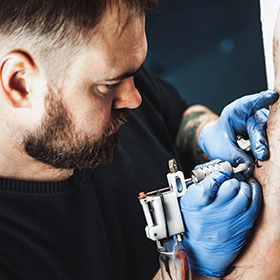Yes, hyaluronic acid is good for tattoos. It helps keep the skin hydrated and promotes healing.
Tattoos are a form of body art that involve puncturing the skin with needles and injecting ink. Proper aftercare is essential to ensure the tattoo heals well and retains its vibrancy. One ingredient often discussed in skincare is hyaluronic acid.
Known for its hydrating properties, hyaluronic acid can be beneficial for tattooed skin. It helps the skin retain moisture, which is crucial during the healing process. Keeping the skin hydrated can reduce itching and scabbing, leading to a smoother recovery. In this blog post, we will explore how hyaluronic acid can aid in tattoo care and why it might be a good addition to your aftercare routine.
Introduction To Hyaluronic Acid
Hyaluronic Acid is a clear substance. It is found in our skin. It helps keep skin moist and smooth. Our body makes it naturally. But you can also find it in many skincare products. It is popular because it can hold a lot of water. This helps keep skin hydrated.
Hyaluronic Acid is in many creams and serums. People use it to fight dry skin. It helps reduce fine lines and wrinkles. It is also used in eye drops and lip balms. It can make the skin look plump and fresh. Many people use it daily for better skin health.
Importance Of Skin Hydration
Hydrated skin feels soft and smooth. It helps to heal faster. Tattoos look brighter on moisturized skin. Hydration keeps skin healthy and elastic. This reduces the risk of cracking. Moisturized skin also prevents itching and flaking. It can make tattoos last longer. A hydrated skin barrier protects against infections.
Dry skin can crack. This leads to pain and discomfort. Tattoos can fade faster on dry skin. It may cause itching and flaking. This can ruin the tattoo’s appearance. Dehydrated skin may take longer to heal. It can increase the risk of infections. Dry skin lacks elasticity. This makes it more prone to damage.
Tattoos And Skin Health
Tattoos create small wounds on the skin. Ink is deposited in these tiny wounds. This can cause skin irritation and redness. The skin’s barrier is temporarily compromised. Proper care is needed to avoid infections. Cleanliness is crucial.
After getting a tattoo, the skin needs time to heal. The process can take several weeks. During this time, the skin may feel tender and itchy. Keeping the area moisturized helps. Hyaluronic acid can be beneficial. It helps to keep the skin hydrated. Hydrated skin heals faster and better.
Role Of Hyaluronic Acid In Tattoo Care
Hyaluronic acid helps skin heal faster. It keeps the skin moist, which is important for new tattoos. Fresh tattoos need good moisture to heal well. Dry skin can slow down the healing process. Hyaluronic acid also reduces scabbing. Scabbing can harm the tattoo design. So, keeping skin moist is key.
New tattoos often cause skin inflammation. Hyaluronic acid helps reduce this swelling. Less swelling means less pain and faster healing. Hyaluronic acid also helps with redness. Redness is common in new tattoos. So, it makes the skin calm and helps the tattoo look better.
Using Hyaluronic Acid On Fresh Tattoos
Fresh tattoos need special care. Hyaluronic acid can help keep the skin moist. But, it is important to use it carefully. Always check the ingredients. Some products may have harmful chemicals. These can irritate your tattoo. Test the product on a small area first. This helps ensure safety. Never apply too much. Your tattoo needs to breathe. Follow your tattoo artist’s advice. They know best.
Clean your hands first. Gently wash the tattoo with mild soap. Pat it dry with a clean towel. Apply a thin layer of hyaluronic acid. Do not rub it in. Just let it absorb naturally. Repeat this process twice a day. Morning and night. Always keep the tattoo moisturized. This helps with healing. Avoid exposing the tattoo to direct sunlight. This keeps the colors vibrant. Follow these steps for the best results.
Long-term Benefits For Tattooed Skin
Hyaluronic acid helps tattoos stay bright. It keeps the skin hydrated and plump. This reduces fading. Your tattoo looks new for longer.
Dry skin can harm tattoos. Hyaluronic acid prevents dryness. It also stops the skin from cracking. The tattoo stays smooth and clear.
Comparing Hyaluronic Acid With Other Products
Hyaluronic acid is a strong moisturizer. It keeps the skin hydrated. Many people use it for their tattoos. It helps in healing. Regular moisturizers also work well. They can be lotion or cream. But hyaluronic acid may provide deeper hydration.
Antiseptics clean the skin. They prevent infection. Hyaluronic acid does not kill germs. It mainly hydrates. Some tattoo artists recommend using both. Clean with antiseptic. Then, apply hyaluronic acid. This helps in keeping the tattoo clean and moist.
Expert Opinions And User Experiences
Dermatologists say hyaluronic acid is good for skin. It keeps skin hydrated. This helps tattoos heal better. Dry skin can make tattoos itch. Hydrated skin can reduce this itching. Hyaluronic acid also helps skin repair itself faster. This means tattoos can heal quickly.
Tattoo artists agree with dermatologists. They often suggest hyaluronic acid for aftercare. It helps keep the tattoo area moist. Dry tattoos can crack. This can damage the design. Using hyaluronic acid can prevent this. It also makes the skin feel soft. This is good for the healing process.
Conclusion
Hyaluronic acid can benefit tattooed skin. It helps with hydration and healing. The ingredient reduces dryness and maintains vibrant colors. Always consult your tattoo artist before using new products. Proper care ensures your tattoo looks great for years. Remember, hydrated skin equals a happy tattoo.
Keep your tattoos moisturized and enjoy their beauty longer.

